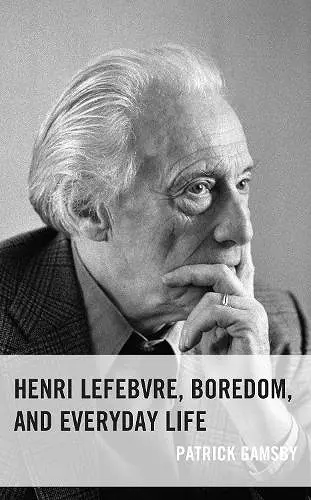Henri Lefebvre, Boredom, and Everyday Life
Format:Hardback
Publisher:Bloomsbury Publishing PLC
Published:23rd Sep '22
Currently unavailable, and unfortunately no date known when it will be back

Henri Lefebvre, Boredom, and Everyday Life culls together the scattered fragments of Henri Lefebvre’s (1901–1991) unrealized sociology of boredom. In assembling these fragments, sprinkled through Lefebvre’s vast oeuvre, Patrick Gamsby constructs the core elements of Lefebvre’s latent theory of boredom. Themes of time (modernity, everyday), space (urban, suburban), and mass culture (culture industry, industry culture) are explored throughout the book, unveiling a concealed dialectical movement at work with the experience of boredom. In analyzing the dialectic of boredom, Gamsby argues that Lefebvre’s project of a critique of everyday life is key for making sense of the linkages between boredom and everyday life in the modern world.
Perhaps a book about boredom should be boring. Much of the text summarizes writings by other scholars, with whom few readers will be familiar, although Gamsby's presentation of Henri Lefebvre’s critique of everyday life within modern capitalism as generating boredom is interesting. However, contemporary life is hardly unique in its boredom. Medieval peasants faced repetitious tedium as they continually tilled the soil. Their boredom was punctuated with frequent festivals. As Gamsby details, industrial capitalism brought scientific management, which stripped production workers of creativity and independence.Even for middle managers and professionals, leisure became routinized and required for keeping up with theJoneses through conspicuous consumption. Corporations doubly profit by exploiting employees and selling them back the latest styles. Urban planners, real estate developers, and companies with indistinguishable branches have destroyed the unique character of most cities. However, the boredom of the city is dwarfed by the monotony of the suburb, a relatively recent creation of the same institutions that ruined urban vibrancy. There, residents who have supposedly achieved the capitalist dream either creep along in rush-hour traffic jams or fill empty hours staring at the television. Recommended. Graduate students and faculty. * Choice Reviews *
Gamsby’s speculative reconstruction of Henri Lefebvre’s unrealized sociology of boredom highlights the virtues of centering a critical theory of modernity on the contradictions and possibilities of everyday life under consumer capitalism. A lively, wide-ranging, and timely contribution to boredom studies that should engage readers in many fields. -- Elizabeth S. Goodstein, author of Experience Without Qualities: Boredom and Modernity
In this rigorous yet lively and accessible study, Gamsby provides us with a reliable guide to the growing literature on boredom and also uniquely contributes by reading boredom primarily through the ‘critique of everyday life’ pioneered by the enigmatic and still oft-overlooked French social thinker Henri Lefebvre. Like his mentor, Gamsby is a ‘partisan of possibilities’ grappling with the myriad complexities, paradoxes, and latent potentialities of boredom, as manifested across diverse spatio-temporal sites and practices, including suburban life, technology, bureaucratized work, and consumption, with an eye to disentangling the banalities from the utopian aspirations the ‘longing for content’ boredom represents. -- Michael E. Gardiner, The University of Western Ontario
ISBN: 9781666900972
Dimensions: 237mm x 158mm x 28mm
Weight: 617g
286 pages